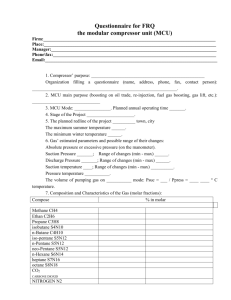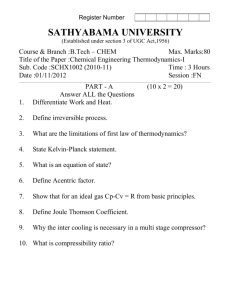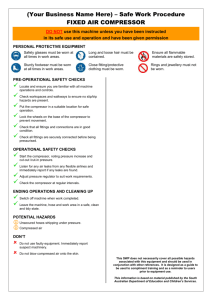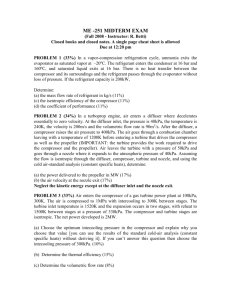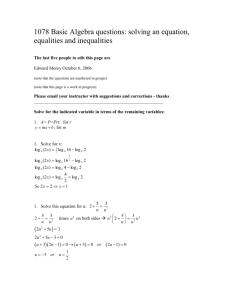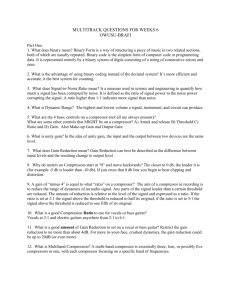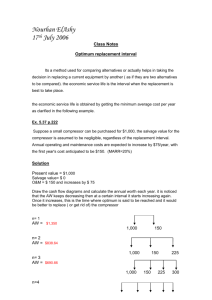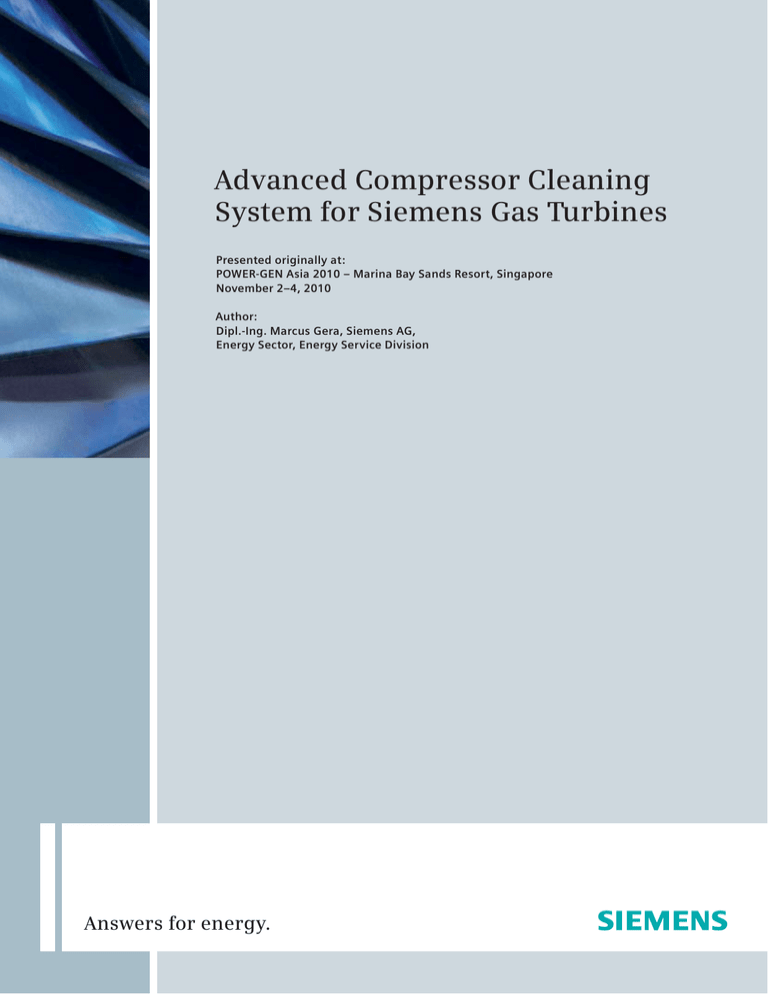
Advanced Compressor Cleaning
System for Siemens Gas Turbines
Presented originally at:
POWER-GEN Asia 2010 – Marina Bay Sands Resort, Singapore
November 2–4, 2010
Author:
Dipl.-Ing. Marcus Gera, Siemens AG,
Energy Sector, Energy Service Division
Answers for energy.
2
Content
Abstract
4
Tasks
4
Scope of supply
5
Off-line nozzle system
6
On-line nozzle system
6
Wash skid
7
Performance of ACCSpro Compressor Cleaning
8
Optional Compressor Wash Prediction (COWAP) analyzer module
9
Customer benefits
10
References
11
Conclusion
11
3
Abstract
Tasks
Siemens Energy answers the permanently
increasing market requirements for combined cycle power plants such as high
performance, low emissions, operational
flexibility, and life cycle cost with continuous research and development process.
Especially the gas turbine as the core
component of a combined cycle power
plant is affected by these requirements.
To help you improve the performance of
your gas turbine and your operating plant
competitiveness Siemens Energy Service
offers many innovative solutions. One
of these is the Advanced Compressor
Cleaning System pro upgrade (ACCSpro).
Many power plant operators have long
since resigned themselves to losing power
because of dirty compressor blades. They
think it is unavoidable. Even the best air
filters still allow lots of micro particles
and some dirt, moisture and, in particular,
CHx compounds, salts and aerosols to
pass through with little hindrance. CHx
compounds not only cling to the blades,
but also help dirt and grime adhere to
them much more strongly.
The consequences include rougher surfaces, higher turbulence levels, deteriorating flow patterns, reduced cross section
of flow, higher compressor outlet temperatures and lower compressor outlet pressures. All this can quickly add up to 4%
loss of power. For a 150 MW gas turbine
compressor, that means 6 MW less output
and corresponding loss of power sale
earnings.
The ACCSpro system sustainably minimizes
the fouling of the compressor blades and
vanes, and was especially designed for the
Siemens heavy duty gas turbine fleet.
While the cleaning effect of most non-OEM
cleaning systems lasts but a few days, our
spraying systems, cleaning solutions and
a well-balanced combination of washing
procedures reduces lastingly new fouling.
Lowest water consumption along with
optimized cleaning effects ensures a permanent power gain and a short payback
time. For the SGT5-4000F (V94.3A) fleet
a Compressor Wash Prediction (COWAP)
analyzer module optimizes the best use
of the system.
4
Low compressor
fouling while using
ACCSpro
The Advanced Compressor Cleaning
System is used to remove deposits which
have formed on airfoils and caused a decline in output and efficiency. Provision
is made for removing such deposits by
performing the cleaning operation either
on-line (at rated speed) or off-line (in
conjunction with the startup equipment).
On-line cleaning is primarily intended for
preventing the accumulation of a layer of
soiling. For this reason, it is recommended
that after commencement of commercial
operation the compressor initially be
cleaned once a day with demineralized
water and every third day with a corresponding cleaning agent. Off-line washing with a corresponding cleaning agent
is performed at reduced speed and has
a more pronounced cleaning effect. Depending on the type of soiling, repeated
cleaning operations may be necessary to
achieve a further improvement in output
and efficiency. If operating conditions permit, off-line cleaning should be performed
once a month or at a suitable opportunity
(if a scheduled or unscheduled shut down
allows for it). The cleaning intervals given
here are intended as guideline values.
Depending on the operating mode of the
gas turbine, pollutants contained in the
intake air, and the type of deposits, optimum cleaning intervals may differ from
those stated in this document. Insights
gained during the course of plant operation will enable the operator to determine
whether this interval can be further optimized by considering all relevant factors.
Scope of supply
The Advanced Compressor Cleaning
System pro (ACCSpro) from Siemens
Energy is just one of the many innovative
modernization packages available.
The scope of this upgrade includes:
■
Computational Fluid Dynamics (CFD)
optimized droplet number and size for
less erosion and better cleaning effect
(OEM developed system)
■
Frame-specific nozzle arrangement
(On- and off-line system)
■
On- and off-line washing sequences
■
Lowest water, detergent, and antifreeze
rinsing fluid consumption
■
Automatic skid with optional
interconnection to the instrumentation
and control system
■
Interconnect piping from the skid
to both nozzle systems
Siemens Energy recommend that the
installation of this upgrade be performed
at a major inspection. The skid and the
interconnect piping installation can be
done before the outage. Siemens Energy
offers a full range of field service capabilities to help you manage your maintenance
and outage schedules.
CFD analysis
5
Off-line
nozzle system
On-line
nozzle system
Off-line cleaning with an appropriate
cleaner will result in more intensive
cleaning at crank speeds. Depending on
the kind of fouling, the cleaning cycle can
be repeated to improve the cleaning effect
with the aim to achieve a further increase
in output and efficiency. If practicable
under the existing operating conditions,
off-line cleaning should be performed once
per month or on appropriate occasions
(but at least 4 to 6 times per year).
On-line cleaning is essentially intended
to avoid the build-up of a layer of dirt.
For this reason, the first measures to be
implemented after the start of commercial
operation should include daily washing
of the compressor with fully demineralized
water. As the unit accumulates more
operating hours, the owner will have
to decide whether an optimum cleaning
interval can be achieved by taking into
account all possible influences.
The off-line nozzle system comprises the
nozzles that are mounted on the inner
cone upstream of the spider that supports
the compressor bearing in the casing.
The spray nozzles in the off-line nozzle
system generate a water spray, which
covers the full airfoil height. Off-line
nozzles are connected to a distribution
ring line mounted in the inner cone.
The on-line nozzle system comprises
nozzles that are mounted on the inner
cone upstream of the spider which
supports the compressor bearing in the
casing. The hollow cone spray nozzles
in the on-line nozzle system generate
a water spray that covers the full airfoil
height. On-line nozzles are connected
to a distribution ring line mounted in
the inner cone.
6
Inner cone distribution
ring system
Wash skid
Skid and I/C-piping
Nozzle System
GT2
GT1
ACCSpro system overview
(application example for two gas turbines)
The water tank is loaded by a permanent
supply connection. Filling the water tank
with demineralized water is performed
automatically using a solenoid valve.
Detergent is filled into the mixing tank.
The detergent filling process is done by
the means of an electrically driven drum
pump which is part of the wash skid
hardware. The permanent demineralized
water connection allows for supplying
the mixing tank with demineralized water.
Optionally, transport containers for cleaning agent and antifreeze can be mounted
above the demineralized water and mixing
tank.
ACCSpro wash skid
A centrifugal pump is provided on the
one hand to prepare a homogeneous
mixture of demineralized water and
cleaning agent and antifreeze rinsing fluid
in the mixing tank, by using a solenoid
valve and to prepare a homogeneous
mixture of demineralized water and antifreeze rinsing fluid in the water tank via
another solenoid valve. On the other
hand, this pump forwards the cleaning
fluid through the solenoid valves at the
skid output connections and then to the
both nozzle systems.
Ambient temperature operation limits:
Operation limits without antifreeze rinsing
fluid: + 8°C (on-line), + 5°C (off-line)
Operation limit with antifreeze rinsing
fluid: – 10°C
With one common skid a maximum
of four gas turbines can be supplied.
Off-line wash sequence
7
Performance of ACCSpro Compressor Cleaning
The consequence of dirty compressor
blades include rougher surfaces, higher
turbulence levels, deteriorating flow
patterns, reduced cross section of flow,
higher compressor outlet temperatures,
and lower compressor outlet pressures,
thus lower compressor efficiency.
The following values show the impact of
1%-point polytropic compressor efficiency
for a SGT5-4000F (V94.3A) gas turbine*:
A frequent compressor cleaning has
two positive effects on the compressor
efficiency:
■
Recover the reversible part of the
compressor fouling
■
Postpone the irreversible compressor
fouling to a later date
■
~ 1.64% GT power
■
~ 1.1% CC power
■
~ 0.96% GT efficiency
■
~ 0.42% CC efficiency
The following graph shows the significant
effect of washing events with ACCSpro on
the compressor efficiency:
The increase in compressor efficiency
has a positive impact on the performance
of the gas turbine as well as on the
combined-cycle (CC) performance,
since it is directly proportional to the
gas turbine (GT) power, GT efficiency,
CC power and CC efficiency.
Overview
Offline w/
CLOSED IGV
91.0
∆=0.22%
Polytropic compressor efficiency in %
∆=0.22%
∆=0.24%
90.9
* expected values (not guaranteed)
∆=0.22%
∆=0.22%
∆=0.44%
90.8
90.7
90.6
90.5
90.4
90.3
Offline
GT Shut Down
ETAVPumre – Part 2
ETAVPumre – Part 4
ETAVPumre – Part 6
ETAVPumre – Part 8
ETAVPumre – Part 10
Linear (ETAVPumre – Part
Linear (ETAVPumre – Part
Linear (ETAVPumre – Part
Linear (ETAVPumre – Part
Linear (ETAVPumre – Part
1)
3)
5)
8)
10)
Online
ETAVPumre – Part 1
ETAVPumre – Part 3
ETAVPumre – Part 5
ETAVPumre – Part 7
ETAVPumre – Part 9
Linear (ETAVPumre –
Linear (ETAVPumre –
Linear (ETAVPumre –
Linear (ETAVPumre –
Linear (ETAVPumre –
Part
Part
Part
Part
Part
7)
2)
4)
6)
9)
90.2
01.05.08
09.08.08
17.11.08
25.02.09
Date
8
05.06.09
13.03.09
Compressor efficiency
increase after washing
events
Optional Compressor Wash Prediction
(COWAP) analyzer module
It is recommended to install the
Compressor Wash Prediction (COWAP)
analyzer module for ACCSpro as a part
of the Thermodynamic Diagnostic Module
(TDM) on Instrumentation & Controlsystem (I&C). It allows for a prediction
of performance recovery by compressor
off-line washing, which implies the
determining of the optimal timing for
the off-line washing.
Furthermore, there are modules for:
■
an overall thermodynamic gas turbine
observation
■
a prediction of performance recovery
by inlet filter exchange
■
a trend monitoring of compressor
efficiency.
How much performance can be actually gained by:
■ changing from part to base load
■ off-line cleaning of the compressor
100
Performance parameter, relative [%]
100
100
98.9
99.2
97.7
95
96.4
96.3
90
86.4
85
80
Power output
Efficiency
Reference level
Potential base load performance after compressor off-line cleaning
Potential base load performance
Actual performance
Prediction of performance recovery
by compressor off-line cleaning
9
Customer benefits
The Advanced Compressor Cleaning
System pro upgrade (ACCSpro) can be
a cost-effective means to help you to
improve the overall performance of your
gas turbine plant.
On-line
wash sequence
Benefits may include:
■
Avoidance of power loss up to 4%
of maximum performance
■
Avoidance efficiency loss due
to reduced compressor fouling
■
Fuel saving through keeping the
specific heat rate
■
Less water and detergent consumption
during on-line wash due to optimized
nozzle numbers and design compared
to the traditional Siemens system
(approx. 30% less water and approx.
25% less detergents)
■
Uncomplicated use of cleaning agents
and antifreeze rinsing fluids
(all Siemens released cleaning agents
and antifreeze rinsing fluids can be
used for the ACCSpro system without
any restrictions)
■
Automatic skid with interconnection
to instrumentation and control system
for information and signal exchange,
including operator’s visualization and
on-line wash control (optional)
■
Optional Compressor Wash Prediction
(COWAP) analyzer module allows visualization and prediction of performance
losses and performance recovery, thereby determining the optimal timing for
an off-line wash
The Advanced Compressor Cleaning
System pro upgrade (ACCSpro) is
applicable for the following gas turbine
frame types:*
■
SGT5-4000F (V94.3A)
■
SGT6-4000F (V84.3A)
■
SGT5-3000E (V94.2A)
Increased availability and reliability
of your gas turbine to deliver maximum
power at base load
■
SGT5-2000E (V94.2)
■
SGT6-2000E (V84.2)
■
Frame and inlet duct-specific coverage
via CFD (perfect surface coverage of the
first blade row)
■
Optimized nozzle arrangement
(nozzle arrangement on the inner cone
only, no inlet duct wall installation)
An even longer-lasting cleaning effect
can be achieved in combination with the
Siemens Advanced Compressor Coating
(ACC) upgrade whereby a special coating
provides a smooth blade surface finish
in the compressor blades and vanes.
■
Optimized droplet size for less erosion
and better cleaning effect
■
Proven and safe nozzle design with
locknut and safety plate
■
* as of June 2010
10
References
Permission
for use
Disclaimer
Siemens Energy has successfully
implemented the Advanced Compressor
Cleaning System pro (ACCSpro) for the
first time in Austria in 2008.
The content of this paper is copyrighted
by Siemens and is licensed to PennWell
for publication and distribution only.
Any inquiries regarding permission to use
the content of this paper, in whole or in
part, for any purpose must be addressed
to Siemens directly.
These documents contain forward-looking
statements and information – that is,
statements related to future, not past,
events. These statements may be identified
either orally or in writing by words as
“expects”, “anticipates”, “intends”, “plans”,
“believes”, “seeks”, “estimates”, “will” or
words of similar meaning. Such statements
are based on our current expectations and
certain assumptions, and are, therefore,
subject to certain risks and uncertainties.
A variety of factors, many of which are
beyond Siemens’ control, affect its operations, performance, business strategy and
results and could cause the actual results,
performance or achievements of Siemens
worldwide to be materially different from
any future results, performance or achievements that may be expressed or implied
by such forward-looking statements. For
us, particular uncertainties arise, among
others, from changes in general economic
and business conditions, changes in currency exchange rates and interest rates,
introduction of competing products or
technologies by other companies, lack of
acceptance of new products or services by
customers targeted by Siemens worldwide,
changes in business strategy and various
other factors. More detailed information
about certain of these factors is contained
in Siemens’ filings with the SEC, which
are available on the Siemens website,
www.siemens.com and on the SEC’s website, www.sec.gov. Should one or more
of these risks or uncertainties materialize,
or should underlying assumptions prove
incorrect, actual results may vary materially
from those described in the relevant forward-looking statement as anticipated,
believed, estimated, expected, intended,
planned or projected. Siemens does not
intend or assume any obligation to update
or revise these forward-looking statements
in light of developments which differ from
those anticipated. Trademarks mentioned
in these documents are the property of
Siemens AG, its affiliates or their respective
owners.
More than 20 units with the proven framespecific Advanced Compressor Cleaning
System are in operation worldwide.
Conclusion
Recent improvements in turbine technology have provided major benefits such
as increased performance and improved
reliability and availability, all of which
have made a gas turbine modernization
project attractive and highly beneficial
for the retrofit in existing power plants.
During the past years Siemens Energy
introduced a wide range of enhancements on gas turbines within the new
unit business as a result of continuous
development work.
Due to very successful prototype results
of ACCSpro in Austria, the series release
for SGT5-4000F (V94.3A) was given
in 2008.
11
Published by and copyright © 2011:
Siemens AG
Energy Sector
Freyeslebenstrasse 1
91058 Erlangen, Germany
Siemens Energy, Inc.
4400 Alafaya Trail
Orlando, FL 32826-2399, USA
For more information, please contact
our Customer Support Center.
Phone: +49 180/524 70 00
Fax:
+49 180/524 24 71
(Charges depending on provider)
E-mail: support.energy@siemens.com
Energy Service Division
Order No. E50001-G520-A387-X-4A00
Printed in Germany
Dispo 34805, c4bs No. 7816, 7821
TH 258-110024 BR 460740 SD 07111.0
Printed on elementary chlorine-free bleached paper.
All rights reserved.
Trademarks mentioned in this document
are the property of Siemens AG, its affiliates,
or their respective owners.
Subject to change without prior notice.
The information in this document contains general
descriptions of the technical options available, which
may not apply in all cases. The required technical
options should therefore be specified in the contract.
www.siemens.com/energy

